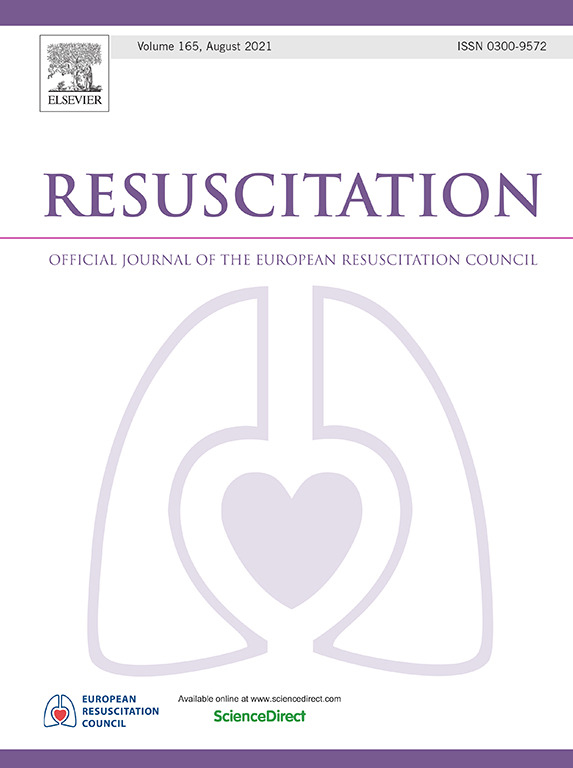2019冠状病毒病大流行对ems目击院外心脏骤停后有利神经预后的影响:一项前瞻性全国观察性研究
IF 4.6
1区 医学
Q1 CRITICAL CARE MEDICINE
引用次数: 0
摘要
目的:评估2019冠状病毒病大流行对日本紧急医疗服务(EMS)人员目睹的心外骤停(OHCA)后良好神经预后的影响。方法:我们在日本进行了一项中断时间序列分析(ITSA),使用前瞻性的、全国性的、基于人口的登记,以评估大流行前(2016年1月- 2020年3月)和大流行期间(2020年4月- 2021年12月)ems - OHCA成年患者的30天有利神经系统预后(脑功能类别1或2)、院前自发循环恢复(ROSC)和30天生存率。亚组分析基于紧急状态宣布状态的分层区域。进行了一项对照ITSA,以比较COVID-19显著传播地区和非显著传播地区之间的结果趋势。结果:共鉴定出58,315例成人ems目击OHCA患者。在大流行期间,有利的神经预后显著下降(相对风险[RR], 0.80;95% CI, 0.71 ~ 0.91;P < 0.001)。院前ROSC和30天生存率也显著降低(p < 0.05)。在亚组分析中,受COVID-19传播影响的地区良好的神经预后下降(p < 0.001),而未受影响的地区没有观察到显著变化(p = 0.243)。对照ITSA显示,与未受影响的地区相比,COVID-19传播地区的有利神经系统预后明显下降(RR, 0.77;95% CI, 0.60 ~ 0.98;P = 0.035)。结论:在2019冠状病毒病大流行期间,日本ems - OHCA患者的神经系统预后较好,特别是在受COVID-19传播影响的地区。本文章由计算机程序翻译,如有差异,请以英文原文为准。
Impact of the COVID-19 pandemic on favourable neurological outcome after EMS-witnessed out-of-hospital cardiac arrest: a prospective nationwide observational study
Aim
To evaluate the impact of the COVID-19 pandemic on favourable neurological outcome after out-of-cardiac arrest (OHCA) witnessed by emergency medical services (EMS) personnels in Japan.
Methods
We conducted an interrupted time series analysis (ITSA) using a prospective, nationwide, population-based registry in Japan to assess 30-day favourable neurological outcome (Cerebral Performance Category 1 or 2), prehospital return of spontaneous circulation (ROSC), and 30-day survival among adult patients with EMS-witnessed OHCA during the pre-pandemic (January 2016–March 2020) and pandemic (April 2020–December 2021) periods. Subgroup analyses were performed by stratifying regions based on state of emergency declaration status. A controlled ITSA was conducted to compare outcome trends between areas with and without significant COVID-19 spread.
Results
In total, 58,315 adult patients with EMS-witnessed OHCA were identified. Favourable neurological outcome significantly declined during the pandemic (relative risk [RR], 0.80; 95 % CI, 0.71–0.91; p < 0.001). Prehospital ROSC and 30-day survival also decreased significantly (p < 0.05). In subgroup analyses, favourable neurological outcome declined in areas affected by COVID-19 spread (p < 0.001), while no significant change was observed in unaffected areas (p = 0.243). The controlled ITSA revealed a significantly greater decline in favourable neurological outcome in areas with COVID-19 spread compared with unaffected areas (RR, 0.77; 95 % CI, 0.60–0.98; p = 0.035).
Conclusion
Favourable neurological outcomes among patients with EMS-witnessed OHCA in Japan were lower during the COVID-19 pandemic, particularly in regions affected by COVID-19 spread.
求助全文
通过发布文献求助,成功后即可免费获取论文全文。
去求助
来源期刊

Resuscitation
医学-急救医学
CiteScore
12.00
自引率
18.50%
发文量
556
审稿时长
21 days
期刊介绍:
Resuscitation is a monthly international and interdisciplinary medical journal. The papers published deal with the aetiology, pathophysiology and prevention of cardiac arrest, resuscitation training, clinical resuscitation, and experimental resuscitation research, although papers relating to animal studies will be published only if they are of exceptional interest and related directly to clinical cardiopulmonary resuscitation. Papers relating to trauma are published occasionally but the majority of these concern traumatic cardiac arrest.
 求助内容:
求助内容: 应助结果提醒方式:
应助结果提醒方式:


